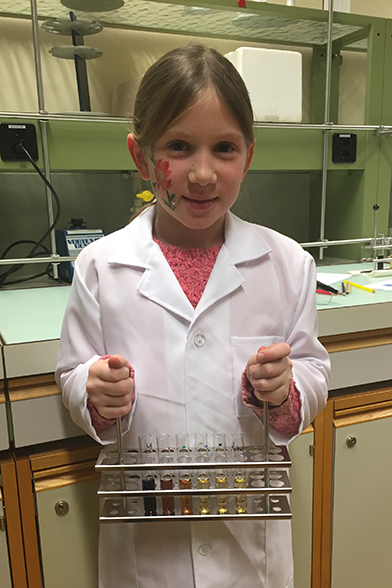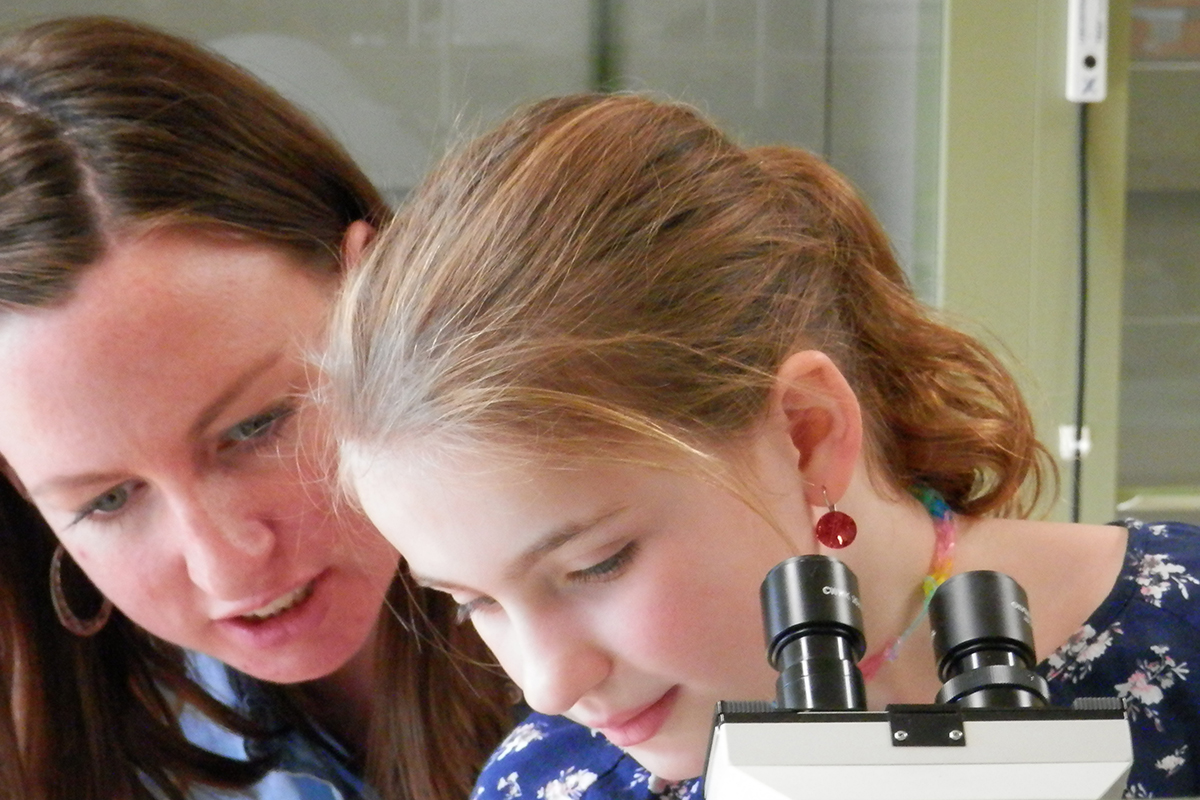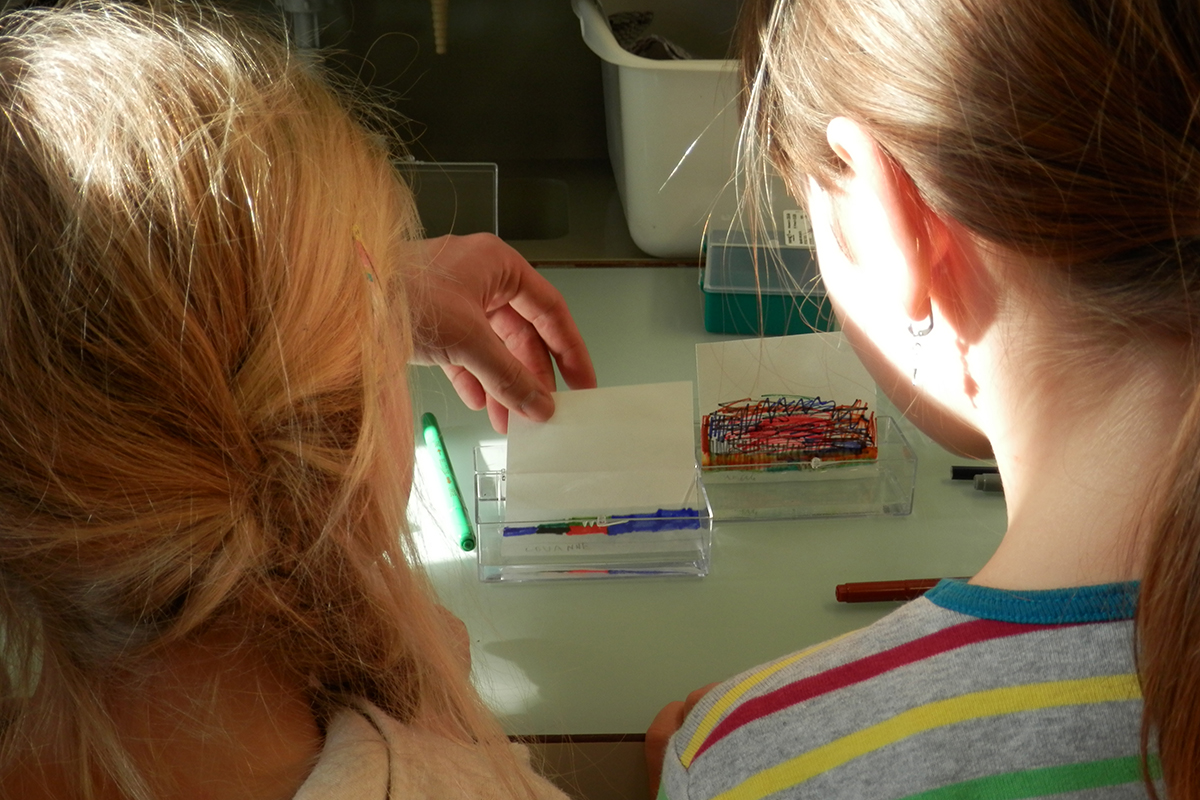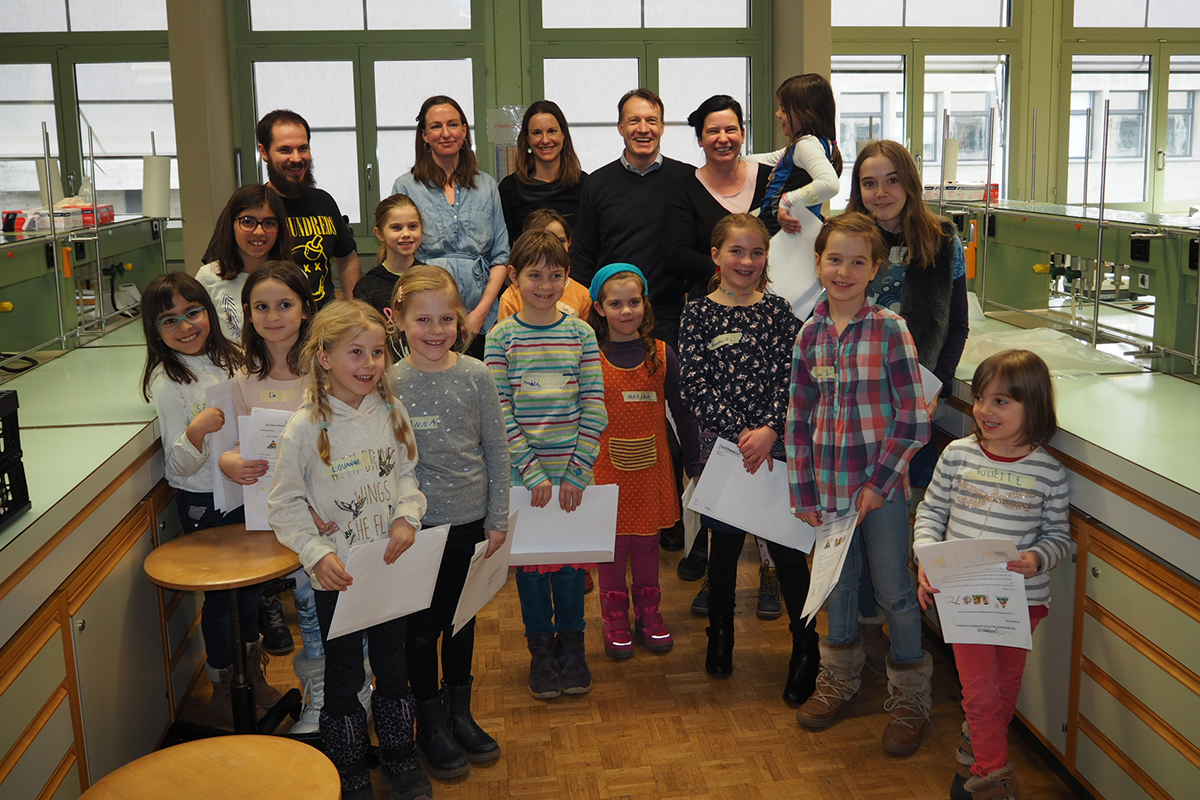Girls in lab coat make first steps in science
In occasion of the yearly "UN Day of Women and Girls in Science", the NCCR TransCure invited young girls between 5 and 10 years old to get a glimpse of lab life. The smiles and the excitement for science on the children’s face were telling more than a thousand words.
Have you ever thought of what saliva actually does in our mouth? Well, the 32 junior scientists now know, thanks to one of the most appreciated experiments – the "decomposer" experiment. Here, the girls could test the activity of amylase, an enzyme produced naturally in the human body. This enzyme (that we will call "decomposer") is found in human saliva and breaks down starch into sugar in our mouth.
Spit out, please!
After spitting out a small amount of saliva into a little tube, the participants used a special dye to make visible the biochemical starch degradation process performed by their own "decomposer". At the end of the experiment, the children could observe that the amylase enzyme activity is not the same in every mouth – sometimes more, sometimes less.

After leaving coats and tubes on the bench, the girls went on to the next task: how do human cancer cells or fleas look like? To provide the answers, the young scientists looked at them under the microscope, beside spiders, fly larvae and other interesting microscope slides. Like real scientists, they could make a drawing for each specimen on their protocol papers.

Also for the next experiment, pencils were required. Performing a so called chromatography, that separates the color components of washable markers, the children could understand the principle of protein purification. This is an everyday chemical method in the lab for the separation of mixed substances, explains Prof. Christine Peinelt, who has been initiating and promoting this initiative. Such a method allows for the separation of proteins needed for a study from other cell components.

With Honours, of course!
After completing all experiments, the girls filled in successfully their lab protocol. But another surprise was just waiting for them. At the end of this “lab tryout” session, each child received a certificate of young scientist as "diploma". Finding out which was the favourite experiment among the aspiring scientists was not an easy task. "All of them! I come next year as well" answered Lena, 8-years old.

Enthusiastic young researchers
Behind the scenes of this event there was the hard work of an excellent team of highly motivated collaborators of the NCCR TransCure and of the Institute of Biochemistry and Molecular Medicine (IBMM) of the University of Bern, who supported the children with the experiments. The enthusiasm of the young girls by the performance of all proposed tasks was a key factor for the success of this event. In addition, the university service for child care (Stiftung für Kinderbetreuung im Hochschulraum Bern, KIHOB) provided support and entertainment for the children during the breaks. Based on the positive feedback, the plan is to offer a similar lab activity for the same age class next year as well, promised the NCCR TransCure director Prof. Hugues Abriel. Possibly, the next event will be open to both girls and boys, according to the demand.
Women and science
Women are still underrepresented in research. The gender discrepancy is particularly evident at the higher academic levels. Swiss-wide, only 21% of all professor positions are held by female scientists. In medical faculties (18%) and especially in natural science ones (13%), women are even more in the minority.
Together with institutional units such as the Gender Equality Office of the University of Bern or the Innerfaculty Commissions for Equal Opportunities at the Medical Faculty (IFKG), the NCCR TransCure puts concrete effort in the support of women in science. Beside measures for the integration of gender equality in the network itself, the first line of action encompasses career supporting initiatives such as workshops, mentoring for women programs (M4W, in cooperation with the IFKG) and support in work-life balance. The lab activity for children within the framework of the UN Day of Women and Girls in Science was meant to raise interest and enthusiasm for natural sciences in young girls. Beyond doubt: science is fun!
NCCR TransCure
The National Centre of Competence in Research (NCCR) TransCure is an interdisciplinary, Swiss-wide network of 19 research groups with the University of Bern as leading house. Its main focus is membrane transporter and ion channel research. Transporters and channels are cellular gatekeepers that move nutrients, drugs and other substances across cellular membranes. Their dysfunction can lead to major human diseases such as cardiovascular and neurological disorders, cancer and osteoporosis. The NCCR TransCure projects are characterized by a unique combination of physiology, structural biology and chemistry and range from fundamental to early stage drug discovery research. Besides fostering high quality science, the NCCR TransCure is active in education, equal opportunities, technology transfer and communication inside and outside the scientific community.
About the authors
Prof. Hugues Abriel is the director of the Institute of Biochemistry and Molecular Medicine (IBMM) and of the NCCR TransCure. He is Delegate for Equal Opportunities in the NCCR TransCure. Prof. Christine Peinelt, who is a principal investigator in the NCCR TransCure since 2016, supports the equal opportunities team. Johanna Portmann is administrative coordinator and Valentina Rossetti is scientific officer and communication delegate of the NCCR TransCure. Kevin Rupp works in the NCCR TransCure as administrative coordinator and represents the coordinator for equal opportunities Jolanda Paganoni during her maternity leave.